- Home
- Robert Fulghum
It Was On Fire When I Lay Down On It Page 8
It Was On Fire When I Lay Down On It Read online
Page 8
But now she is in college and it is 1988 and she is outraged by all the lies she has been told. She knows now that the Pilgrims did not dress in black all the time; they did not come to found America; and they were not communists or fascists, but rebels who ran away from home so they could go to church how and when and where they wanted to. (Just like my young friend.) They drank wine, ate good food when they had it, smoked tobacco, had sex … and young Puritans got to lie in bed together with their clothes on with a board between them—“bundling”—and any teenager could get around that. Then the Pilgrims built Harvard University, where my young friend is now, and where all those fine Pilgrim traditions are continued to this day. (“We don’t use a board in bed now, though,” says she.)
Furthermore, the Pilgrims did not celebrate Thanksgiving Day and did not pray some great prayer. All they did was EAT their bellies full because they were so hungry. And none of their relatives dropped in from out of town, either; the Pilgrims came to get away from their relatives—the ones in England who wanted them to go to the right church. My young friend can relate to this version of the Pilgrims—they were her kind of guys.
Oh yes, and about the Indians—they don’t celebrate Thanksgiving, either. Once was enough, actually. Ever since they had lunch with the Pilgrims, they’ve had nothing but trouble and not enough to eat. My young friend is taking a course in Native American culture, a trendy class that turns out fledgling shamans each term.
This is but a short summary of a much longer telephone call on Thanksgiving Day. Mostly she was lonely back there in New England. Like the Pilgrims once, I suppose.
Talking to college students is always instructive—nice to know what the younger generation is stirred up about. It’s true that history is confusing. And my young friend will encounter several more versions of the Thanksgiving story and all the rest of the human story before the picture begins to clear. Her feeling that the Pilgrims were a lot like her is progress. I suspect they were.
And me—well, my version is that whatever happened on that autumn day in 1621, what went through the minds of the Pilgrims that night as they laid them down to sleep was not too different from what goes through mine each year at the feast’s end:
“Dear God, I’m glad that’s over … we all ate too much again … but nobody got hurt … now it is quiet and we are all warm and dry and have a nice place to sleep … life goes on … and for now, that is not only enough, it is pretty fine … and I, for one … give thanks.”
A UNITARIAN MINISTER IS OFTEN ASKED to perform interfaith marriages. “Mixed marriage” is the common term. But widely differing religious backgrounds are not usually all that’s involved. Any wedding wherein the bride or groom is marrying someone outside the family borders of race or class is “mixed.” To be asked to perform such a marriage is to join two people trying to cross a mine field without getting blown apart.
The paradigm is the wedding of a very lovely young woman from Brooklyn. Huge family. Polish immigrant stock. And Jewish. Her tall, dark, and handsome fiancé hailed from Detroit. Likewise a huge family. Likewise immigrant stock, but Irish. And Roman Catholic. The bride’s family included a rabbi and a cantor; the other team had some priests and a nun on the roster. It was bad enough that the young man and woman had come all the way out West to Seattle to attend graduate school; bad enough that they might not marry someone from the old neighborhood; but to fall in love with and, even worse, MARRY someone “not like us” was a shameful disaster—a familial earthquake of the first magnitude. Unthinkable.
But Ms. Brooklyn and Mr. Detroit were twenty-one years old and overwhelmed with Love. And Love, they were quite certain, could find a way through any obstacle. The minister had his doubts, having a few shrapnel wounds on his soul from having not made it through mine fields with such couples before.
Now from here on out in this story—almost to the very end—the pieces of the plot fall like dominoes. So predictably did it go that I could have made money on side bets as to what was going to happen next. I could have told them, but they wouldn’t have listened. Sometimes people have to find out things for themselves. Here’s how they saw their options:
Plan A: Get married by a judge and never tell the folks back East. But—and here comes Love again—they really loved their parents and if their parents found out, which they were bound to, they would be deeply wounded, especially when they found out there hadn’t been a religious ceremony of some kind. And so—
Plan B: Get married by a Unitarian minister and tell the parents a day later. A kind of semi-elopement. The parents had no idea what Unitarians believed, but at least it was a religious deal and in a church. Good idea. Enter the Reverend Mr. Fulghum. Which led to—
Plan C: As long as the wedding was going to be in a church with a minister, they might as well invite just a few friends instead of having only two witnesses. And as long as they were inviting those few friends, they might as well invite a few more friends, since they didn’t want to hurt anybody’s feelings. And since they were now at the soft edge of the list where the category “friend” and the category “acquaintance” merge, they might as well just go ahead and invite everybody they knew. So now we have a big wedding—a juggernaut, in fact. Because if you have all those people, you have to have a reception—you can’t just say this is really a small wedding, so everybody go out somewhere for coffee. And, of course, if you are going to have all those people and a reception, then you can’t just have a dinky little wedding and be embarrassed in front of all those people. No sir. The long white dress, rented tuxedos, flowers, attendants, photographers, rings—the whole kit and caboodle. All because they thought having just a few more people would be a nice idea. Guess what comes next? Right.
Plan D: They can’t do the whole hoo-ha and not invite the families. Mine field, here we come.
(I note in passing that weddings always tend to get a little out of hand. I’ve never seen one get smaller or stay in budget. One thing always leads to another. It’s kind of like marriage itself. Or life. And why not? When it comes to joy and celebration, let it be expansive, always.)
Anyhow. They stepped on a mine. The Big One. Called their mothers and invited them to the wedding. The couple called from my house, and the phone hasn’t worked right since. Probably fried the wires all the way back to Detroit and Brooklyn. The mothers were united in their response. “YOU’RE MARRYING A WHAT? A WHAT!” followed by silence and a lot of sobbing. Then the daddies got on the line and the sum of their remarks was, “COME HOME NOW, THIS MINUTE, NOW.”
For a month the mail and phone calls flowed like a waterfall. Uncles and aunts and cousins got in the fray. The rabbi wrote a thirty-page letter. The priests and nun prayed. The families were NOT COMING, EVER, to such a wedding. The families threatened blackmail, hellfire, and heartbreak. Bribes were offered. No matter; nothing could dissuade the couple. Not even being disinherited, which was the ultimate threat thrown at them by both families.
Not that the bride and groom were unmoved. They spent a lot of time in the Reverend Mr. Fulghum’s office—the bride bawled, the groom swore. But the marriage was meant to be, come hell or high water, both of which seemed well on their way. But the couple had an invisible shield: Love. And a secret weapon: a sense of humor—light hearts. They laughed as often as they cried.
Too, they came from tough, resilient folks who had made it the hard way and had always told their kids not to back off when they believed in something. The kids were doing exactly what their parents had taught them to do. They believed in each other. And that was that.
The tiebreaker in this standoff was a grandma. The grandmother of the groom. By God, if her only grandson was getting married, no matter to a YOU-KNOW-WHAT, then she was going to be there. For the sake of the unborn grandchildren who would need her. Besides, she hadn’t approved of her daughter-in-law, either, but that had worked out just fine, thank you. Granny was serious—she went and bought a ticket—SHE was coming to the wedding. Period.
&n
bsp; Thus the dominoes fell. If Grandmother was coming, then she would need support—she couldn’t go alone, of course—and pretty soon all the Irish Catholics from Detroit were coming. They’d show those Jewish yahoos from Brooklyn what real FAMILY LOYALTY was all about. And they’d bring Uncle Dickie, the priest, to keep things as godly as possible.
Well. You know what happened next. Thirty-five Brooklyn Jews, including Grandfather Rabbi, had plane tickets.
The wedding began to shape up like a grudge match between Notre Dame and Jerusalem Tech. In physics they call this “achieving a critical mass.”
Sure enough, they all came. And then it really got complicated. The grandfather rabbi begged to at least be allowed to say a traditional blessing in Hebrew at the end of the service. When the Irish Catholics got wind of this, nothing would do but that the grandmother, who had once performed in light opera, should sing Schubert’s “Ave Maria” before the blessing, as a kind of prophylactic to the Hebrew. One side wanted a little incense used, and the other wanted to have some wine in the ceremony and then break the goblet. The bride and groom could do little but nod their heads and smile and say “Whatever” to whatever was proposed.
Come the great day, Saturday evening—after sundown, to please the you-know-whats—the families marched into the church and sat down—no, “dug in” would be the more accurate phrase, on either side of the aisle. For a time I would have given 6-to-5 odds in favor of a free-for-all following the ceremony instead of a reception.
Ah, but I keep forgetting about Love. The Irish Catholics from Detroit loved the groom; no less than the Polish Jews from Brooklyn loved the bride. And for very good reasons—they were remarkable young people, worthy of pride and respect, even if they didn’t have a brain in their heads when it came to choosing a mate. And even the most bitter, jaundiced critic of the match had a hard time ignoring how tall and handsome the groom was or how enchanting was the bride. And you’d have to be really blind to miss what happened during the ceremony—when the couple said their vows, it was clear they meant every word. And when the bride began to weep and her groom took her in his arms and wept, too—well, the whole church was awash in tears. I’ve seen wet weddings before, but this turned into a communal bath. The whole thing ground to a halt while everybody had a good cry. The minister included. Even Uncle Dickie the priest, lurking out in the vestibule lest he get contaminated by the proceedings, was seen dabbing his eyes and blowing his nose.
What was happening was simple, really. Joy had jumped us all from behind about the time the bride said, “Yes, oh yes, YES!” when the minister asked if she took this man, etc. Something very old and fine and new and good was plainly happening. Only a head or heart of stone would have missed it. Joy. Unspeakable affirmation of something right. So we wept on, for lack of words.
It was then that the grandmother of the groom—the grand matriarch of the Irish Catholics, seventy-eight years old—rose to sing “Ave Maria.” She did not come all this way to let her grandson down. She stood by the piano, took a deep breath, closed her eyes, and delivered the goods. Never have I heard the song offered with more feeling, more passion and fervor. She was magnificent. Not the scratchy, over-dramatic sounds you might expect from an aging third-rate opera singer. No. This was the voice of a grandmother distilling her life into the music for a once-in-a-lifetime occasion to honor what she loved and believed in. When the last lovely note faded and silence held us firm, Grandmother opened her eyes, smiled at her grandson, and said, “There, now.”
And the Brooklyn Jews gave her a spontaneous standing ovation. They might not have known what was proper to do in a church, but they knew music and they knew that Grandma had given it all she had—and they knew great love when they saw it. She was their kind of guy. And a standing O was called for. Yea, Grandma!
Grandfather Rabbi was not about to be outdone. He walked slowly to stand close by the bride and groom. He reached out and took their hands in his. And then, speaking for Abraham, Isaac, Jacob, and all the Jews of Brooklyn, he laid a blessing on the couple that ought to last them the rest of their lives. I mean they were BLESSED, and you didn’t have to understand Hebrew to know it.
So, of course, as you would hope, the Irish Catholics gave Grandfather Rabbi a standing ovation he will never forget. Yea, Grandpa!
That’s when the minister sighed a deep sigh of relief, knowing that Joy had won the day, and the possibility of a happy ending to this affair was real. A happy ending. More than anything else in this life, we hope for some happy endings. And we were about to have one.
What the families had not understood until the end of the wedding was that they had many of the same values and traditions, despite their arguments over metaphors for ultimate things. They believed in family, faith, love, the same God, and the capacity to celebrate those things.
The bride and groom rushed off down the aisle to the reception hall, where a polka band was waiting. The newlyweds danced and everyone applauded. Grandfather Rabbi asked Grandmother Opera Singer to dance, and the crowd roared and then joined them and the party was on. Never have I been to such a reception—never was there such dancing and eating and laughing and singing—long, long into the night. Magnificent!
Three days later, when my head cleared, I wondered how it had happened. And decided that the skeptical minister had been wrong and the bride and groom right. Love was more powerful than prejudice—Love won out. I don’t know that I am totally convinced, but in this case it’s what the evidence points at. The final score was Love—21, Evil Spirits—zip. When in doubt, trust those you love—all of them.
(Epilogue. A year later, close to the first anniversary of this amazing occasion, I received a postcard mailed from a cruise ship in the Caribbean. From the bride and groom, I thought. No. From the parents of the bride and the groom, who have become great friends.)
WEDDINGS ARE USUALLY THOUGHT OF AS fairytale times when Real Life is momentarily suspended. “And they lived happily ever after” seems possible, if only for a day. When my children were small and their daddy tried to end bedtime stories with the happy ending, one of them would always ask, “And THEN what happened?” How could I tell them that Cinderella discovered she was married to a guy with a foot fetish and that glass slippers hurt like hell? How could I tell them that the frog who was kissed by the princess might have turned into a prince, but still had the personality of a frog and ate flies for breakfast instead of cereal? What I know about real life suggests those are not unreasonable answers to the and-then-what-happened question.
I tell couples, in mock seriousness, that the warranty on the wedding license is only good for twenty-four hours. The odds on a marriage lasting are 50–50 now, which means that a minister is often asked to perform a wedding wherein one or both parties have been previously married. They did not live happily ever after the first time around. But they know something now—about themselves, about real life, and about marriage. And their weddings reflect their wisdom.
For one thing, they know, as I know, that the real wedding and the real vows don’t happen on the day of the formal social occasion.
There comes a time, usually some days after the proposal and acceptance, after the announcement and setting of the date and all the rest, when there is a conversation between two people in love, when they are in earnest about what they’ve agreed to do. The conversation happens over several days—even weeks. Partly in a car driving somewhere, partly at a kitchen table after supper, partly on the living-room floor, or maybe on the way home after a movie. It’s a conversation about promises, homes, family, children, possessions, jobs, dreams, rights, concessions, money, personal space, and all the problems that might arise from all those things. And what is promised at that time, in a disorganized, higgledy-piggledy way, is the making of a covenant. A covenant—an invisible bond of commitment. Just two people working out what they want, what they believe, what they hope for each other. With their eyes, they ask each other if they really mean it, and they do. Then they sea
l it with a whole lot more kissing and hugging than you’ll see in public. And that’s it. The wedding is done. All that’s left to do is the public celebration, however they choose to do it.
I know this sounds like heresy—that the Church Fathers might not agree. But if you are married, you know it’s true. That’s why I always tell couples to pay more attention to what’s going on in that talking time before the Big Day. They wouldn’t want to miss their own wedding.
When couples come to me for a second marriage, they have always spent most of their time and energy on that talking time and are a lot less concerned about the Big Day than they were the first time. They know that companionship in the kitchen around suppertime is vastly more important than the color of the bridesmaids’ dresses. They know that good company and friendship count for more than good looks. And they know that marrying a frog is fine if you really like the frog a whole lot and don’t expect princely transformations. (It’s also what you know if the first marriage worked and you are about five years into it and plan to stay.) It’s not as romantic the second time, but it’s not without love. The love tends to be richer, deeper, wiser this time.
These last several paragraphs are background to a fine story. Two brothers married at about the same age—early twenties—over in the Dakotas somewhere. One brother was handsome, the catch of the town. The other was a real toad: short and squatty, and he loved to sing in a toady voice. The handsome brother married a beautiful woman, and the toad married a frog. The couples lived close by one another and raised families together. Neither couple was really happy—they had workable marriages, but not satisfactory ones. But an outsider to the relationships would never know the truth. The children grew up and made marriages of their own. The handsome brother died of a sudden heart attack at age fifty, and the wife of the toad was killed in an automobile accident.

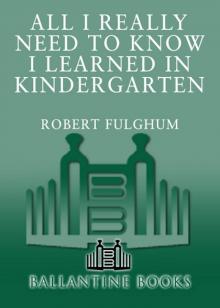 All I Really Need to Know I Learned in Kindergarten
All I Really Need to Know I Learned in Kindergarten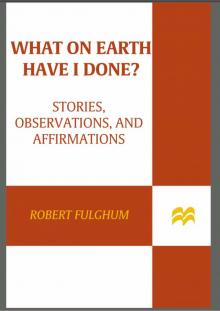 What On Earth Have I Done?
What On Earth Have I Done?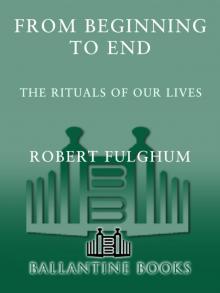 From Beginning to End
From Beginning to End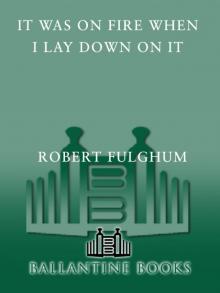 It Was On Fire When I Lay Down On It
It Was On Fire When I Lay Down On It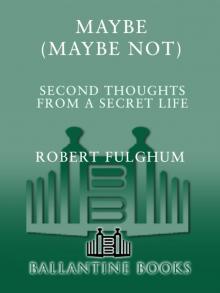 Maybe (Maybe Not)
Maybe (Maybe Not)